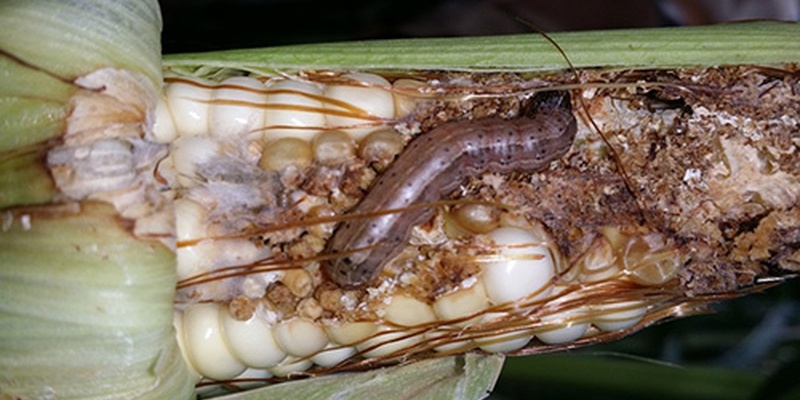Fall Armyworm - an Emerging Food Security Global Threat
Posted on Thu, 25 Oct 2018, 09:04

The Fall Armyworm is a major threat to food security and spreads quickly since the moth can fly up to 100 km in one night. Photo credit: FAW team/Yemen
18 October 2018, Rome, Italy - The highly destructive, and fast spreading, Fall Armyworm (Spodoptera frugiperda) poses a real threat to global food security. Furthermore, it cannot be eliminated once it has infested a country. Originally, native to the Americas, the Fall Armyworm (FAW) was first detected in Africa in 2016 and has now spread to all sub-Saharan countries. It has also recently been detected in Yemen and India.
It has been estimated that maize yield reduction per year from FAW across Africa may be of 8 to 16 million tons, the estimated value of this loss is USD 2400 to 4800 million per year, remarked Hans Dreyer, Director of FAO s Plant Production and Protection Division at the FAW side event during 2018 Committee on Agriculture (COAG) meeting.
A 2018 report from the Democratic Republic of the Congo illustrates Fall Armyworm s (FAW) huge threat to food security: It estimates that 45% of maize harvest losses are due to FAW attacks and have resulted in a loss of 0.9 million tonnes of maize during the 2017-2018 harvest season. Indeed, the insects prefer maize - a key food crop in Africa - as well as rice, sorghum, millet, sugarcane, vegetable crops and cotton.
The FAW spreads quickly as the moth can fly up to 100 km in one night. Furthermore, it can spread as a stowaway in aircraft or on other means of transportation, or through trade - for example in infested commodities. Many countries in Africa and the Near East are thus implementing strategies to prevent or manage infestations.
The FAO of the United Nations is assisting these countries through twenty ongoing projects in Africa - with at least 10 more in the pipeline. The International Plant Protection Convention (IPPC) community has also organized regional workshops to foster cooperation in preventing and managing the FAW.
The IPPC has an important role to play in helping prevent the spread of the Fall Armyworm - especially due to travel and trade, emphasized Jinyuang Xia, Secretary of the IPPC. South-South Cooperation, as well as more technical and financial support, are necessary to manage ongoing infestations.
Special session on the Fall Armyworm at the IPPC Workshop in Africa
During the special session on FAW at the IPPC regional workshop in Africa, participants shared their experiences in managing the pest:
-
Many countries highlighted the importance of increasing awareness about the FAW and providing training and support (including through South-South cooperation) to farmers for dealing with it.
-
Namibia reported that it has been successfully using biological pesticides to combat FAW, while Guinea is using systemic pesticides in place of contact pesticides.
-
The DRC said it was important to establish an NPPO Information Exchange Platform for Armyworm Management and strengthen collaboration between research institutions.
Special session on the Fall Armyworm at the IPPC Workshop in the Near East and North Africa (NENA)
A special session on the highly destructive FAW helped addressed the growing concern about its rapid spread in the region. The session aimed at:
-
strengthening the coordination between FAO and NENA countries to foster the early detection of, and good practices for managing, the Fall Armyworm;
-
sharing lessons learned from managing the FAW in sub-Saharan Africa; and
-
introducing participants to the Fall Armyworm Monitoring and Early Warning System (FAMEWS) mobile app and global platform developed by FAO.
Participants from the Sudan and Yemen shared their experiences about the programmes they have put in place to fight FAW since initial infestations were reported. Egypt shared its preparedness and contingency plan to face a future infestation.
FAO s response to the Fall Armyworm
In addition to providing direct assistance to countries and farmers, FAO and its partners are working on:
-
recommendations on the use of synthetic pesticides and biological control (including bio-pesticides);
-
a FAW monitoring and early warning programme - including a mobile app and a global platform for sharing results;
-
Farmer Field School curricula and communications; and
-
South-South cooperation to integrate lessons learned in managing FAW in the Americas.
The IPPC s The Strategic Planning Group (SPG) at its meeting from 9 to 11 October 2018 in Rome discussed how the IPPC community can address this challenge.
In his presentation at the SPG meeting, Shoki Al-Dobai, IPPC Secretariat Integration and Support Team Leader, highlighted how the IPPC has fostered cooperation and knowledge sharing in preventing and managing the FAW among IPPC contracting parties. The IPPC also plays an important role in helping to prevent the spread of the Fall Armyworm - and minimize the risk of the movement of the pest, through commodities and means of transportation, in international trade.
Mr Al-Dobai highlighted a specific set of IPPC International Standards for Phytosanitary Measures (ISPMs) that can help countries enforce suitable effective measures to prevent and regulate the pest. These include pest risk analysis, pest surveillance, requirements for the establishment of pest free areas, phytosanitary inspection and different phytosanitary treatments.
To find out more, see:
 Special session on the Fall Armyworm at the IPPC Regional Workshop for the Near East and North Africa (September 2018)
Special session on the Fall Armyworm at the IPPC Regional Workshop for the Near East and North Africa (September 2018)

